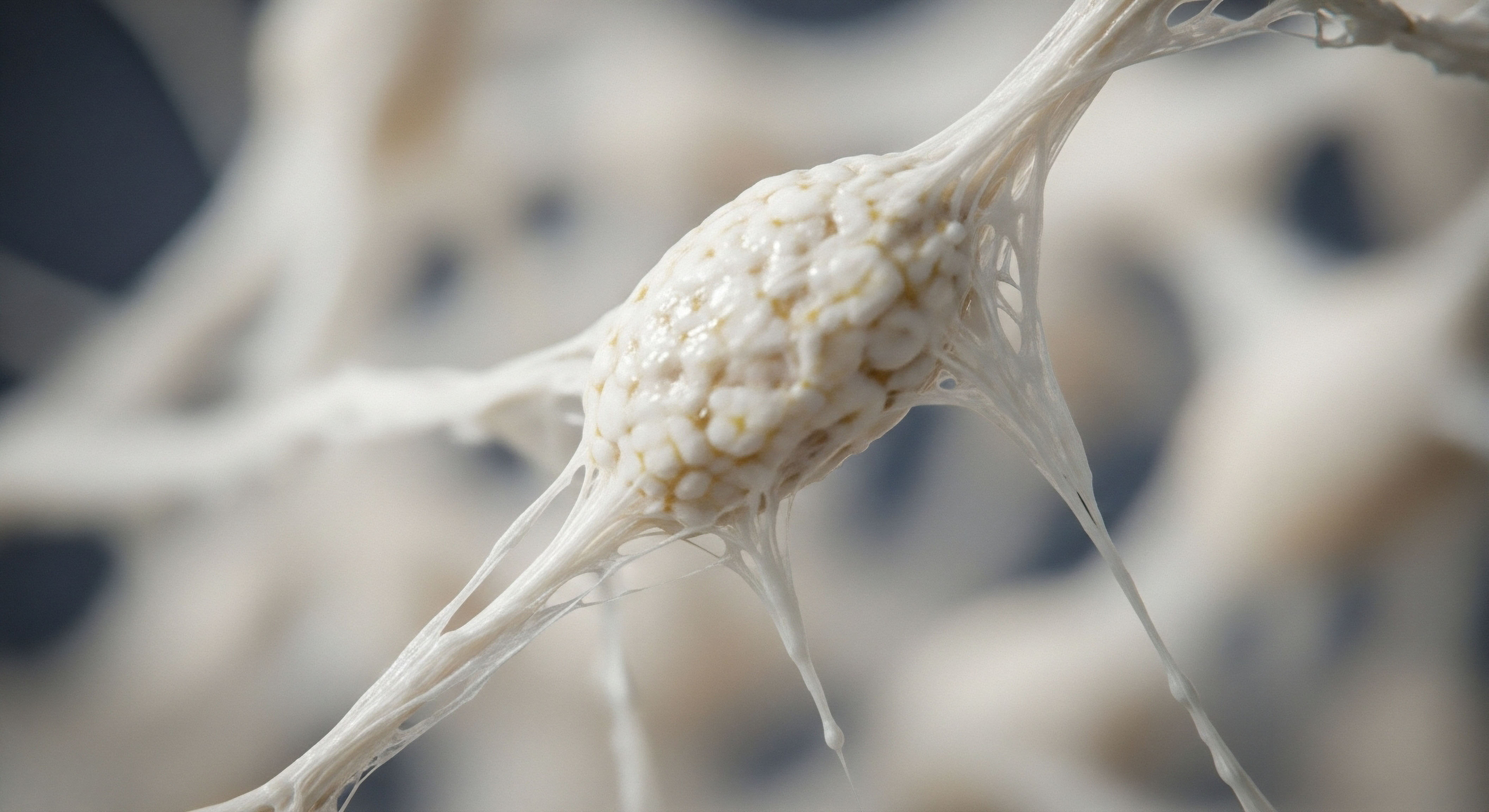

Beyond the Genetic Hand You Are Dealt
The prevailing narrative surrounding aging has long cast it as an unavoidable descent, a predetermined biological fate. This perspective limits human potential. A new understanding is taking hold, one grounded in a profound appreciation for the body as a dynamic, adaptable system. Longevity is a consequence of intelligent design and precise intervention, not merely a matter of chance. We recognize aging as a process with identifiable levers, pathways open to strategic adjustment.
This emerging field, often termed longevity medicine, distinguishes itself from conventional approaches. Traditional medicine excels at addressing existing symptoms and conditions. Longevity medicine, by contrast, emphasizes proactive health management, early diagnostics, and targeted interventions designed to delay or prevent age-related decline. It represents a shift from reactive measures to a deliberate, forward-looking strategy.

The Blueprint of Biological Decline
Our biological systems, left unmanaged, gradually lose their efficiency. Hormonal output diminishes, cellular repair mechanisms falter, and metabolic pathways become sluggish. This decline manifests as reduced energy, compromised cognitive function, and a loss of physical prowess. Understanding these foundational processes provides the starting point for intervention. We identify the specific areas where the system requires reinforcement.
Consider the endocrine system, a master regulator of vitality. Hormones such as testosterone, estrogen, and progesterone orchestrate countless physiological functions. As we age, their production naturally wanes, impacting muscle mass, libido, mood, and cognitive acuity. These shifts are not passive occurrences; they represent critical junctures for strategic recalibration.
“Currently, there are over 90 FDA-approved peptide therapies, with more than 150 in clinical trials and approximately 600 in preclinical development. Globally, medical practices are leveraging peptide therapies to treat cancer, infectious diseases, metabolic disorders, injuries, and a host of other conditions.”

Reclaiming Your Biological Edge
The opportunity exists to intervene with precision, supporting the body’s innate capacity for self-repair and regeneration. This involves understanding the intricate signaling networks that govern cellular health and metabolic efficiency. Peptides, short chains of amino acids, function as powerful signaling molecules, acting as messengers within the body. They modulate essential cellular processes, including inflammation, tissue repair, regeneration, and metabolic activity. Their role extends to functioning as growth factors, neurohormones, and neurotransmitters, enabling precise regulation across numerous biological systems.
This approach recognizes that optimal health is not a fixed state but a continuous process of dynamic equilibrium. We aim to sustain this equilibrium, even enhance it, well into what was once considered inevitable decline. The pursuit of longevity transforms from a passive hope into an active, engineered endeavor.


Engineering Peak Human Performance
Achieving sustained vitality demands a multi-modal strategy, one that addresses the core pillars of biological function. This involves targeted interventions across hormonal balance, peptide signaling, and metabolic optimization. Each element serves as a precision tool, designed to bring the body’s high-performance systems into alignment.

Hormonal System Recalibration
Hormone Replacement Therapy (HRT) stands as a foundational strategy for restoring endocrine function. For men, Testosterone Replacement Therapy (TRT) addresses symptoms associated with age-related decline, such as muscle loss, diminished libido, fatigue, and mood changes. Thoughtfully managed TRT can improve metabolic health, support cardiovascular function, and enhance overall physical performance.
For women, estrogen and progesterone supplementation supports cardiovascular and brain health as they age. These interventions aim to return hormone levels to a youthful, optimal range, supporting robust physiological function.
The goal is not simply to raise levels, but to achieve a harmonious endocrine environment, where each hormone operates within its optimal window, supporting the body’s complex feedback loops. This is a nuanced process, requiring meticulous monitoring and personalized dosing to maximize benefits and mitigate risks.

The Power of Peptide Signaling
Peptides offer a refined approach to influencing specific biological pathways. Over 90 FDA-approved peptide therapies exist, with hundreds more in various stages of development. These molecules direct cells to perform targeted actions, such as producing more collagen, triggering fat breakdown, or releasing growth hormone. They act as intelligent messengers, delivering precise instructions to the body’s cellular machinery.
- GLP-1 Receptor Agonists ∞ Peptides like Semaglutide and Tirzepatide mimic glucagon-like peptide-1, regulating blood sugar, appetite, and metabolism. They slow gastric emptying, enhance insulin secretion, and possess potential anti-inflammatory and neuroprotective effects. These actions contribute to visceral fat reduction, a key factor in mitigating chronic disease and supporting longevity.
- Growth Hormone Secretagogues ∞ Peptides such as Sermorelin stimulate the body’s natural production of growth hormone. This supports muscle mass, bone density, and recovery, counteracting the age-related decline in growth hormone levels.
- Healing and Repair Peptides ∞ Molecules like BPC-157 and TB-500 support tissue repair, reduce inflammation, and bolster immune and metabolic health. They accelerate recovery and fortify the body against the daily wear and tear of living.
“Peptide therapy can help improve insulin sensitivity, regulate thyroid function, and enhance the body’s ability to use energy efficiently.”

Metabolic Optimization Strategies
Metabolic health underpins all longevity efforts. Efficient metabolic processes maintain cellular health and energy production, actively counteracting age-related decline. Strategies involve not only peptide interventions but also precise nutritional inputs and lifestyle adjustments. These ensure the body processes nutrients effectively, manages energy stores, and minimizes cellular stress.
Bio-regenerative peptides, for instance, influence energy expenditure and fat oxidation, promoting the conversion of white fat into beige fat, which burns calories to produce heat. This effect supports optimizing the body’s energy balance and reducing metabolic burden, thereby supporting cellular health and longevity. Stable blood sugar levels and controlled caloric intake contribute to extended lifespan and reduced incidence of age-related diseases.


Timing Your Biological Ascension
The implementation of bio-optimization protocols is a dynamic process, informed by individual biomarkers and evolving physiological responses. It begins with a comprehensive assessment, establishing a baseline of health markers, hormonal profiles, and metabolic indicators. This initial data provides the essential roadmap for personalized intervention.

The Iterative Path to Optimal Function
Interventions are introduced strategically, often in phases, allowing for precise monitoring of their effects. This iterative approach enables fine-tuning dosages and protocols to achieve the desired outcomes. Regular follow-up assessments are paramount, tracking changes in biomarkers, subjective well-being, and performance metrics. This ensures the protocol remains aligned with the individual’s unique biological signature and long-term vitality goals.
For instance, initiating TRT requires a commitment to ongoing blood work to monitor testosterone levels, estrogen metabolites, and red blood cell counts. Peptide protocols, while often more acute in their application, also benefit from structured cycles and breaks, allowing the body to respond optimally and prevent receptor downregulation. The “when” is a continuous dialogue with your biology, guided by data and expert interpretation.

Early Intervention, Enduring Impact
The most profound impact of bio-optimization often stems from proactive engagement. Addressing hormonal imbalances or metabolic inefficiencies early can prevent the cascading effects of age-related decline. For example, intervening with GLP-1 agonists to manage early signs of insulin resistance can protect pancreatic beta cell function and mitigate future cardiometabolic risks. This strategic timing shifts the focus from repairing damage to preventing its onset, preserving the integrity of biological systems for decades.
The decision to begin bio-optimization is a personal one, but the scientific consensus points towards the advantages of early, informed action. Waiting for overt symptoms to manifest reduces the window of opportunity for maximal impact. This is a commitment to a life lived at peak capacity, not a reaction to decline. The future of vitality is now, and it demands decisive, informed action.

Your Life, Engineered to Last
The notion of a predetermined lifespan belongs to a past era. We now possess the tools and the scientific understanding to actively shape our biological future. Bio-optimization is a deliberate choice, an assertion of control over the mechanisms of aging.
It transforms the body from a passive recipient of time’s passage into a finely tuned instrument capable of extended performance and profound vitality. This journey is an ongoing commitment to excellence, a relentless pursuit of the optimal self, powered by precision science and unwavering intent.



